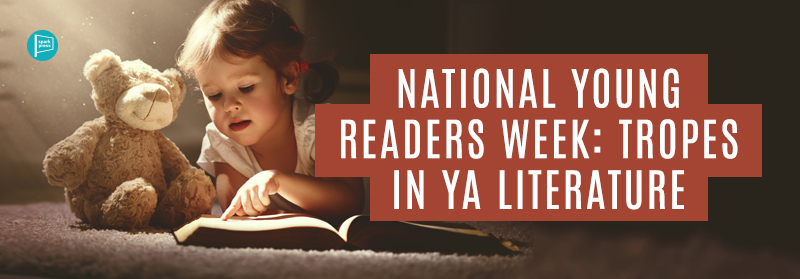
It is common for a youngster to claim that they hate reading, but the reality of the situation is that they may have just not found a book or story that intrigues them enough to read it. The second week of November marks National Young Readers Week. Children, parents and anyone who wants to are enormously encouraged to read, bond, and find the wonder and awe that books bring to the world. It is also a challenge to schools everywhere to promote literacy in young readers. Raising awareness about the importance of reading not only lets the younger generations get excited about reading, but also helps them to start thinking critically about the stories they read.
There are so many different genres and worlds immersed in books. Yet, the tropes that live in them have existed for centuries. Young adult and children’s literature is filled with tropes that the world and history can’t get enough of.
So, what are some of the common tropes found in Young Adult and Children’s literature?
Common Character Tropes
The character tropes that exist are endless. However, some of them are more prominent and popular than others. One of the most popular tropes in young adult and children’s literature is the main character being an outsider. They don’t fit in and struggle to conform to whatever society they exist in. It sets the character up as a unique and rebellious person, one in which people identify and sympathize with. Holden Caulfield, from the Catcher in the Rye, is one of the best known outsiders in literary history. Misunderstood with deliberate trust issues, Holden keeps his audience glued to his coming-of-age story.
Another trope that is monumental in the younger generation is The Chosen One trope. This trope gives the protagonist a purpose and is usually relatable to the younger generations. It stands as an inspiration, to challenge oneself to grow and show they are worthy of the “The Chosen One” title. Frodo Baggins in The Lord of the Rings and Harry Potter from Harry Potter are different Chosen One archetypes in their own worlds. Many times this trope requires fatal flaws and aspiring greatness, which is why it is so popular in young adult and children’s literature. Being a Chosen One character is also commonly accompanied with the dead parent, or parents, and being an orphan trope. This kind of character proves that no matter where you come from, anyone can change the world.
A lot of times the Royalty trope is a mix of The Outsider and The Chosen One tropes. It is once again a character working towards honor and the right to carry a righteous title, and sometimes is an outsider of the kingdom. Paul Atreides, from Dune by Frank Herbert, is the heir of House Atreides, rulers of the planet Caladan. After some family drama, he ends up leaving his path to his rightful throne and must start his journey of proving himself, again. Many times, the character is reluctant to become royalty, the responsibility seemingly too great. Yet, this trope allows the character to mature and gives a lot of potential to their character arc. It is truly a coming-of-age story that has never gotten old.
Romance Tropes
Romance tropes have always existed. Their varying characters, settings, and situations have become a favorite. There are romantic themes found across literature, from Greek mythology to the Bible to modern book series like Percy Jackson. A love interest can heighten the risks of conflict. There’s the Fake Relationship trope, like Lara Jean and Peter Kavinski in To All the Boys I’ve Loved Before by Jenny Han. Forbidden Love is always a favorite for those who love star-crossed lovers like the tragic Romeo and Juliet. First Love is an inspiration for all generations; a reminder of the nostalgia of butterflies in the stomach and first kisses, and burning desire to find that one first, true love. Bridge to Terabithia by Katherine Paterson has the sweet, innocent, and tear-jerking first love between Jess and Leslie. Then there are Love Triangles, a messy, sometimes dramatically funny trope that is an oldie, but a goodie. This can be seen in The Mortal Instruments when Clara falls for Jace, but Simon, Clara’s best friend, has always been in love with her. Romance tropes create tension, encourage character development, and invite emotional investment. It’s always fun trying to anticipate heartbreak or a happily ever after.
“Book it to the Library”
Young Adult and Children’s literature plays a huge role in the development of children and young people. It also creates a nostalgic atmosphere for adults. It is a genre of literary art that is perceived to be for the juvenile and is usually determined by the genre and the “intended” age of the reader. However, these tropes are seen across the board in every genre, written and enjoyed by all ages.
Young Readers Week encourages reading for all ages—so grab your favorite book, or a new book, or a classic book, and help the younger readers of the world find their way into the magic of reading!

Leave A Comment